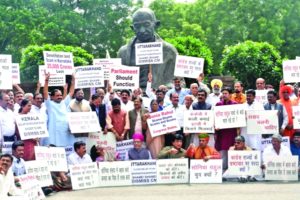Gutter Politics

By Vijay Badhwar
Indian voters are easily excitable. And political goons make no mistake not to exploit them.
Imagine a dysfunctional parliament not able to discuss anything for the whole Budget Session, pass legislations without chaos and raising ruckus, without placards and shouts from the well, with no respect for the Speaker or for the very purpose they are in the parliament – to represent their constituents in a democratic way.
May be India’s Speaker in the Lower House, Sumitra Mahajan, takes a leaf from Australia’s former Speaker, Bronwyn Bishop, who once ejected 18 Members in a single question time. Before she, herself, was sacked, she held the record to expel more than 400 Members, mostly from the Opposition.
Why are they not allowing the Parliament to function.
First it was to demand special status for Andhara Pradesh. The demand has been held unconstitutional by the courts. Then it was the SC/ST (Preventions of Atrocities) Act which the Supreme Court amended to stop people being put behind bars without the charge against them being proved, to provide safeguards against malicious charges being laid against people who may be innocent. This was following Article 21 (Personal Liberty).
Bowing to mass protests mobilised by Opposition parties which led to nine deaths and large scale destruction of public property, the Centre did file a review petition not to amend the Act that the Supreme Court rejected.
Then the Parliament was held to ransom on the perennial issue of distribution of Cauvery waters. The dispute between the two states of Tamil Nadu and Andhara Pradeep has been ongoing since the middle of 19th century in British times. The Cauvery waters are distributed among four states of Andhara, Tamil Nadu, Puducherry and Kerala, the last two with minor stakes. Recently, the Supreme Court allowed 14 Tmcft more water to Karnataka, reducing Tamil Nadu’s share from 419 Tmcft to 404 Tmcft.
The issue of water distribution remains unresolved as one of the states is always unhappy either with the Central Government or the Supreme Court. If the unhappiness is with the Centre, then they want the matter reviewed by Supreme Court and vice versa. Does it warrant disruption of Parliament?
This is democracy at its worst. We need to revisit our behaviours and accept the finality of decisions constructively. If matters are not resolved by discussion, then it’s jungle rule.
The Opposition parties are experimenting on a joint front realising that separately they can not fight the popularity of Prime Minister Modi. Rahul Gandhi is no match for him, neither any of the other leaders from other parties – Mayawati, Mamata Banerjee, Akhilesh Yadav, even Nitish Kumar who is an ally of the Bharatiya Janata Party (BJP). Why Rahul Gandhi leads the pack is that Gandhi family holds a cache of funds that can be used to mobilise crowds as was the case on Jat reservation movement and more recently on the SC/ST issue.
The Opposition rightly claims that the BJP indulged in similar disruptive tactics in the times when Congress ruled. Before it becomes a parliamentary norm that a small number of MLAs indulging in uncivilised behaviour are able to disrupt functioning of a democracy, the rules of running the two Houses of Parliament should be tightened that the largest democracy in the world is not turned into largest fish market that it is today.
Mahatma Gandhi once said, “A born democrat is a born disciplinarian. Democracy comes naturally to those who abide by all laws, human or divine.”
Short URL: https://indiandownunder.com.au/?p=10797
